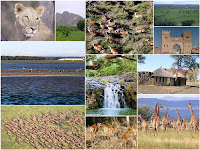In Search of Biofuels
Biofuels are produced from plants and plant-derived materials. They reduce carbon dioxide and other greenhouse-gas emissions when used to power engines, cars and other road vehicles. Can biofuels be the answer to a greener and more sustainable future for our Planet?
Biofuels, if extracted from certain plants and in certain ways, can serve us very well; but for it to be produced from food plants such as: wheat, corn, oil palm, sugar cane, sugar beet and soy - would only bring more misery than good. Already, with the recent high rise in the price of oil and the use of food plants to produce biofuels, food prices, World wide, rose so high that many people across the Globe have been driven to hunger. And then there is the problem of more land and more water being required for the production of biofuels; which could lead to deforestation and be destructive to our water resources. To clean up our environment, is very important and to find alternative means to serve our energy needs, is necessary; but how to do that without causing more misery and problems - should be of an even higher priority.
In theory, algae produces oil and can generate 15 times more oil per acre than other plants used for biofuels, such as corn and switchgrass. Algae can grow in salt water, freshwater or even contaminated water, at sea or in ponds, and on land not suitable for food production. Could algae be the answer and be the best means in having a better alternative to fossil fuels? Or, should atmospheric physicist's, Carl Hodges, approach - drawing seawater inland, irrigating otherwise barren coastal desert regions and turning them green with seawater tolerant plants, such as salicornia - be the way forward? Hodges already has such a 'farm' in progress, in Mexico. Or, could the jatropha plant be the solution to the world's desperate search for new sources of energy and ease the burden on food costs? Or, can switchgrass be the key?
No doubt: different regions and different places will have different choices for plants and different ways for producing biofuels. One thing is certain: with oil production at its peak and no new large fields being discovered; and with demand rapidly increasing for fuel - other ways and means, will have to be used to serve the World's energy hunger. One of which will certainly be the increasing use of biofuels.
Biofuels, if extracted from certain plants and in certain ways, can serve us very well; but for it to be produced from food plants such as: wheat, corn, oil palm, sugar cane, sugar beet and soy - would only bring more misery than good. Already, with the recent high rise in the price of oil and the use of food plants to produce biofuels, food prices, World wide, rose so high that many people across the Globe have been driven to hunger. And then there is the problem of more land and more water being required for the production of biofuels; which could lead to deforestation and be destructive to our water resources. To clean up our environment, is very important and to find alternative means to serve our energy needs, is necessary; but how to do that without causing more misery and problems - should be of an even higher priority.
In theory, algae produces oil and can generate 15 times more oil per acre than other plants used for biofuels, such as corn and switchgrass. Algae can grow in salt water, freshwater or even contaminated water, at sea or in ponds, and on land not suitable for food production. Could algae be the answer and be the best means in having a better alternative to fossil fuels? Or, should atmospheric physicist's, Carl Hodges, approach - drawing seawater inland, irrigating otherwise barren coastal desert regions and turning them green with seawater tolerant plants, such as salicornia - be the way forward? Hodges already has such a 'farm' in progress, in Mexico. Or, could the jatropha plant be the solution to the world's desperate search for new sources of energy and ease the burden on food costs? Or, can switchgrass be the key?
No doubt: different regions and different places will have different choices for plants and different ways for producing biofuels. One thing is certain: with oil production at its peak and no new large fields being discovered; and with demand rapidly increasing for fuel - other ways and means, will have to be used to serve the World's energy hunger. One of which will certainly be the increasing use of biofuels.


